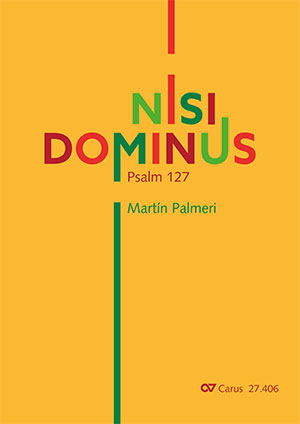11 questions for the composer Martín Palmeri
Martín Palmeri has composed a setting of the psalm “Nisi Dominus” to celebrate Carus-Verlag’s 50th anniverary. Alongside discussing his Misatango — a piece treasured by many choirs — Palmeri reveals what he does when he’s not making music or composing.
Misatango is one of your most popular pieces. How did you come up with the unusual combination of tango and Latin mass?
At the beginning of my career in Buenos Aires, I worked as choir conductor and, at the same time, as a pianist and director of a tango orchestra. Many singers from my choir loved the tango and came very often to see our concerts with the tango orchestra. So it was natural to start thinking of a project we could do together. After some experiments with no good results from traditional tangos, I decided, rather than arrangements, it would be better to compose original music for choir and tango orchestra. And that was the beginning of Misa a Buenos Aires.
Is it necessary for the performers of your works to have a basic knowledge of tango music?
If the musicians have experience in tango, then so much the better, especially the pianist, contrabass and bandoneon. There are many skills when playing these instruments that make a big difference during performance.
When Carus-Verlag commissioned you to write a new composition for the 50th anniversary of the publishing house, how did you approach its composition?
The first point is to choose the text. It is a difficult point because it should be a text with contrast between expressive parts and parts with a strong character and which should generate 20 minutes of music. Then the process as usual: working in the analysis of the text, looking for the best themes for each sentence, and – the most difficult – finding the balance and good proportions for the complete work!
The vesper psalm “Nisi Dominus” offers wisdom on finding happiness in life, teaching that happiness cannot simply be “made” by oneself. It’s about the lives of ordinary people: their homes, families and finding peace. What attracted you to setting this particular text to music?
Of course, absolutely. Also, the tango, as popular music was created by lots of generations working together and at its beginning mostly by regular working people. It is music to share between friends. And we should remember the dance, which is in couples but also always in group.
Some people also call the psalm the “student psalm” because it states it’s not worth getting up early. Are you an early riser?
Well, many years ago as a “bohemian composer”, I loved to work late at night, but today I enjoy the morning more as a chance to exercise and run along the river.
When and where do you prefer to compose?
At home in my studio, but I have to say that my best ideas were born all over the place during my travels: at hotels, houses of friends or just on the streets…
What has been your most emotional musical experience so far?
Maybe when my pieces are sung in not 100% Catholic countries like Morocco, Egypt, Israel, Turkey, China, India, etc. And I am very proud that my music has been accepted in countries with different credos.
Could you tell us about your next compositional project?
I finished an opera in Italian, with text by Francesco Querubini, which will be premiered next July in Italy. I am also working on a Requiem, a commission from editorial Eurindia, and a piece called Suite Rio de la Plata, based on a text by Alfonsina Storni, which is another commission from il Coro Calliope di Ticino Switzerland.
You travel a lot across the world. Where do you feel most at home? And why?
Well, I couldn’t say one place or country. Maybe the best place is always where you have friends.
Everybody is allowed to dream … What do you recommend to a culture lover who visits your native city Buenos Aires? What should they definitely experience there?
The new auditorium CCK, San Temo, and try to find an orchestra in a less touristy place. It’s difficult to say where because they change the auditoriums all the time.
If you didn’t compose or make music, then…
…I would be watching movies and traveling with my family to Patagonia in Argentina. We have a farm in the Andes Mountains.
Martín Palmeri
Nisi Dominus
Carus 27.406/00
Martín Palmeri (born in Buenos Aires) is an Argentine composer and conductor. His vocal and instrumental works, including operas, oratorios, choral and orchestral compositions, are inspired by tango nuevo with regards to their form and harmony. His most famous work is probably the “Misatango” (Misa a Buenos Aires), which is performed by choirs worldwide.





Leave a Reply
Want to join the discussion?Feel free to contribute!